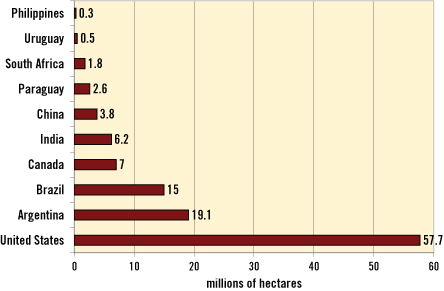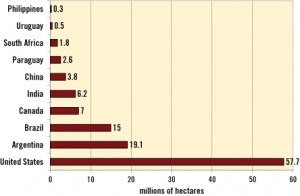
Yes, We Have no Bananas
 Summertime is here.
Summertime is here.
My mom served seedless watermelon, orange honeydew melon, and some gorgeous large strawberries for dessert last night. Yummy. The fruit was delicious.
It occurred to me that probably all of them were GMO’s of some sort. And that this is increasingly the trend which we’ll stick with, given the food crisis and all the attention to boosting food production that we’re seeming to turn towards as a solution. The stuff tastes great, is beautiful, longer-lasting on the shelves, frost/mold/bug resistant or whatever, and there are no known side affects to our health. WRI just put out a good briefing on GMO’s and food production that mentions the UN’s finding that we do need to up our food production levels by 50% by 2030 so as to meet the growing demands for food. The potential benefits and potential risks of GM crop production are a great short primer on the issues.
 As long as I’m on about fruit, let’s talk bananas. They are one of the oldest crops (perennial herb, actually!) that humans have manipulated, though I’m not sure what percentage of bananas we get in the US are of a GMO variety. There’s an editorial I read today about banana prices going up over $1 a pound, which mentions a banana virus going around which is so damaging that we may not have many more left in Latin America, in between 5 and 20 years… Hearing stuff like this adds some substance to the risk that monocrop production and fewer varieties of a given crop will do us in, because of the loss of our traditional varieties that might otherwise buffer us from massive crop failures. This is complex stuff and I’m no expert; it does seem natural to me, though, that bananas should cost more than the ridiculously cheap 39 cents a pound.
As long as I’m on about fruit, let’s talk bananas. They are one of the oldest crops (perennial herb, actually!) that humans have manipulated, though I’m not sure what percentage of bananas we get in the US are of a GMO variety. There’s an editorial I read today about banana prices going up over $1 a pound, which mentions a banana virus going around which is so damaging that we may not have many more left in Latin America, in between 5 and 20 years… Hearing stuff like this adds some substance to the risk that monocrop production and fewer varieties of a given crop will do us in, because of the loss of our traditional varieties that might otherwise buffer us from massive crop failures. This is complex stuff and I’m no expert; it does seem natural to me, though, that bananas should cost more than the ridiculously cheap 39 cents a pound.
The international trend, however, seems inevitably to be turning towards boosting our food production levels substantially, and only after this to start looking at re-integrating traditional knowledge. At least that’s my take on the international policy directions, throug reading this report from the IAASTD.
I am reminiscent about the delightful messiness of watermelon seed-spitting contests. It is hard to find a seed-containing watermelon these days. As for finding one of those tasty, small golden bananas that I ate every day in Brazil, or finding anything other than the Cavendish banana variety in these Chicago grocery stores, I will try not to dream of it today.
Comments are closed, but trackbacks and pingbacks are open.